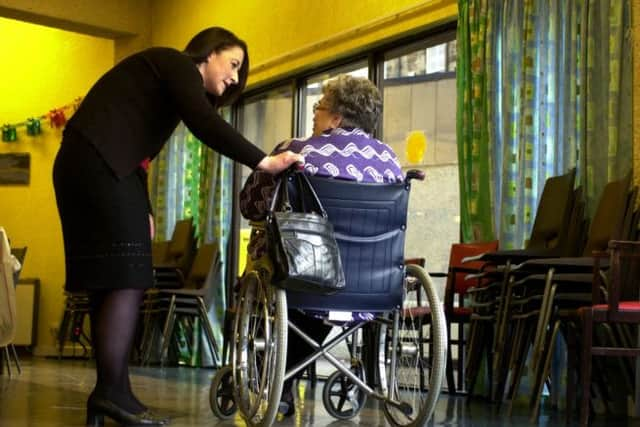Carers driven to the bread line by cuts and rising costs


A study ordered by the charity Carers UK has found more than four in 10 carers are saddled with debt, which for one in seven exceeds £10,000.
But it is warning more families will be pushed to the brink owing to welfare cuts totalling £1bn over the next four years, and calls for urgent measures to aid financially-stricken carers.
Advertisement
Hide AdAdvertisement
Hide AdThere are 541,000 carers in the region, nearly half of whom do not work.


Nationally, the charity’s Caring and Family Finances Inquiry shows that a third of carers are more than £20,000 worse off as a result of caring and a fifth rely on overdrafts or credit cards.
One in 10 have plundered their savings to play a lifeline support role for a family member or friend and the situation is so desperate for some that almost half have reined in spending on essentials like food and heating.
The charity’s chief executive, Heléna Herklots, said carers are being made to feel undervalued even though they save the Government £119bn a year through the unpaid care they provide.
Advertisement
Hide AdAdvertisement
Hide Ad“Those caring, unpaid, for loved ones save society vast sums, but at huge personal cost – a cost this inquiry shows is pushing families to the brink,” she said.
“Caring is often a dual blow, with household incomes hit by reduced earnings, and bills rising as a result of the extra costs of ill-health or disability.
“With an ageing population, more of us will care for loved ones – yet a blizzard of cuts to social care and benefits mean there is less and less support available.”
The £1bn cuts account for the impact of changes between 2011 and 2018 to Carer’s Allowance, the introduction of the bedroom tax, a means-tested benefits freeze and the scrapping of council tax benefit.
Advertisement
Hide AdAdvertisement
Hide AdCarers UK is calling for cuts to carers’ benefits and support services to be stopped, urgent reform of financial help for carers and a new “carer” test for future benefits and social care proposals.
Carer’s Allowance, which is the main carers’ benefit, is £59.75 a week for a minimum of 35 hours caring – equivalent to £1.67 an hour. In April, it is set to rise by 2.7 per cent to £61.35 a week.
The Department for Work and Pensions (DWP) said it was spending around £2.07bn on Carer’s Allowance this year compared with £1.96bn last year.
Universal Credit, the new benefit that has started to replace six existing benefits with a single monthly payment, will allow carers on low incomes to keep more of their own money as they move into work, while offering greater flexibility if they need to take a break, the DWP said.
Advertisement
Hide AdAdvertisement
Hide AdBut Ms Herklots said the Government was failing to appreciate the limited capacity of some carers to hold down a job.
“The Government cannot afford to send the message that carers should stop caring and ‘get a job’ – not only is it insulting to the millions of families struggling with little support to care for disabled or older loved ones, but it fails to recognise that if they stopped caring the cost to the state would be immense,” she said.
The Yorkshire area manager for the Independent Age charity, Jacoba Oldham, said Carer’s Allowance had in effect been devalued, with the rises that take place each April failing to reflect real-term increases in the cost of living.
“The decision to change the way Carer’s Allowance gets uprated in line with inflation accounts for nearly half the total sum taken out of carers’ pockets and this has clearly had a devastating impact on carers’ finances,” she said.
Advertisement
Hide AdAdvertisement
Hide Ad“It’s also startling that there are now twice as many over-85s providing unpaid care compared to 10 years ago. This may suggest that fewer over-85s qualify for council-funded care and support, leaving them with no choice but to care for their spouse or loved one, despite the fact that many of these people are likely to be dealing with health issues of their own.”
Four weeks into a new scheme run by the Carers’ Resource charity in Bradford, 18 people have requested emergency help with fuel bills and for food parcels and winter clothing.
Anna Jackson, the charity’s head of development, stressed it was vital that people seek support if they cannot cope. She said: “There are services out there for carers and they need to face up to the situation, reach out and get help. A lot of the time the ethos of carers is to get their head down and try to cope, but the key message from us is to reach out for some support.”
Families pushed to the edge: Page 9; Comment: Page 10.